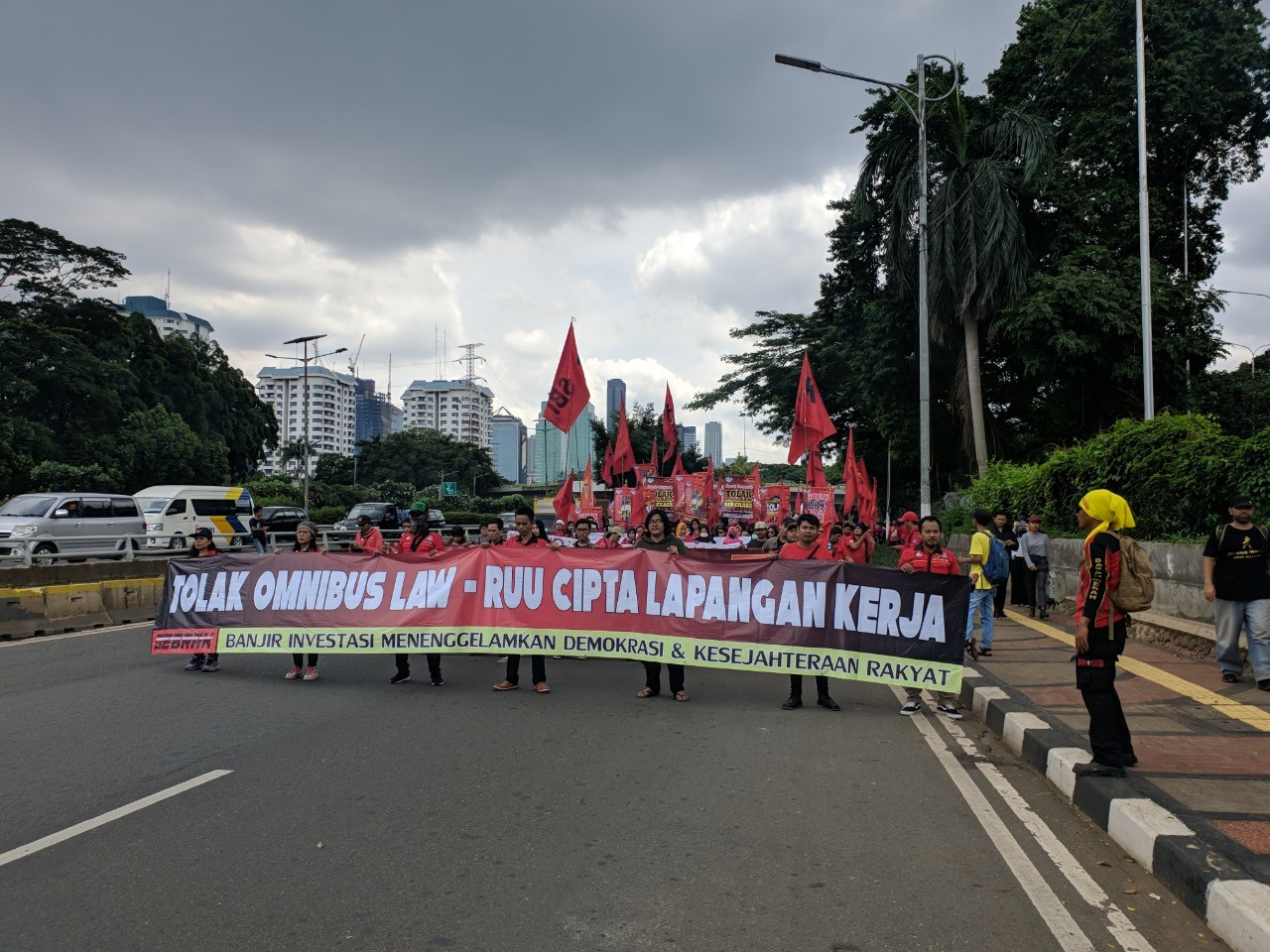Popular Reads
Top Results
Can't find what you're looking for?
View all search resultsPopular Reads
Top Results
Can't find what you're looking for?
View all search resultsWorkers, students continue to protest omnibus bill
Change text size
Gift Premium Articles
to Anyone
L
abor and student groups continue to demonstrate against the government’s omnibus bill on job creation. They say they have been excluded and are seeking involvement in the creation of a regulation that, as it stands, is expected to change Indonesia's labor market to be more flexible and attractive for investors.
Hundreds of people representing seven labor unions and organizations, including student groups, under the Labor with the People Movement (Gebrak) voiced their rejection of the omnibus bill that is expected to change workers' severance pay, working hours and minimum wage, among other points.
"We will not become slaves in our own country," said a demonstrator marching towards the House’s main gate in Jakarta on Monday.
The government is still formulating the omnibus bill on job creation and plans to submit it to the House of Representatives to begin deliberations this month. While few details have been officially announced, bits of information about what might be included in the labor reform bill have trickled out onto the Internet.
The government has planned for labor market flexibility by allowing hourly pay to be included in the omnibus bill on job creation, according to Coordinating Economic Minister Airlangga Hartato and Industry Minister Agus Gumiwang.
"Flexible-hours work, as well as easy hiring and easy firing principles will be discussed. The technicalities will be under the Manpower Minister," Airlangga said on Dec. 30.
Students and labor groups under Gebrak argued that the clauses would benefit businesses more than workers because the private sector could possibly abandon labor rights and the minimum wage and create longer working days.
The bill would also allow companies to hire outsourced and contract-based workers without a maximum time limit, according to their statement. It would also remove labor rights such as severance pay and insurance and would provide no punishment for companies that did not provide universal healthcare insurance BPJS to employees, the Gebrak statement contends.
The labor alliance also criticized President Joko “Jokowi” Widodo for putting the people at risk for the sake of economic growth and attracting investment.
"We will not become slaves in our own country," said a demonstrator marching towards the House’s main gate in Jakarta on Monday. (JP/Moch. Fiqih Prawira)Jokowi’s administration is writing three omnibus bills on job creation, taxation and small and medium enterprises to facilitate business in Southeast Asia’s largest economy, attract investment and stoke smoldering growth.
According to the World Bank’s ease of doing business index, which ranked Indonesia 73rd, the country’s rigid employment and minimum wage regulations are among the factors causing the country’s stagnating rank.
“Strict employment protection legislation shapes firms’ incentives to enter and exit the economy, which in turn has implications for job creation and economic growth […] A 10 percentage-point increase in the minimum wage in Indonesia was associated with a 0.8 percentage-point decrease in employment on average,” the report reads.
The demonstration follows another that occurred on Jan. 9 of approximately 100 protesters, representing about 20 labor groups in the Jakarta Labor Movement (GBJ), on the streets of Tanjung Priok port in North Jakarta in response to the government's plan to reform current labor regulations.
“We are suspicious that the omnibus bill will bring about a flexible labor market by depriving workers of their basic rights, including the reduction of severance pay and a proposal on wage calculations based on working hours,” said GBJ spokesperson Jumisih during the protest.
“Workers will be forced to work without certainty because the bill will make them more vulnerable to layoffs and outsourcing. These patterns of modern exploitation will make workers’ wages far from decent.”
The bill is being written behind closed doors and does not take into account the public’s perspective, she added. (mfp)











